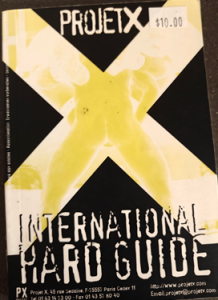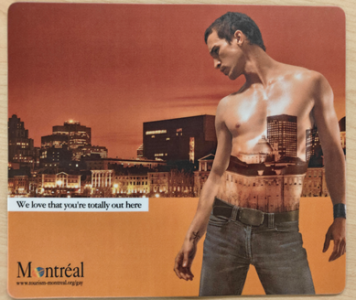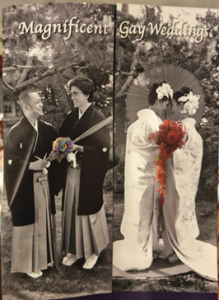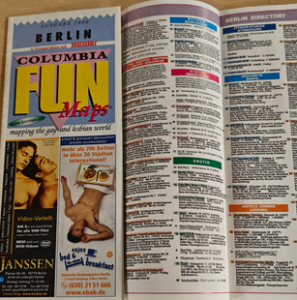Many thanks to guest blogger Quinn Monleon for contributing the below post! Quinn is a graduate student at the UBC School of Information and completed a co-op position with Rare Books and Special Collections at UBC Library this past summer.
As Project Librarian at RBSC during a summer co-op from May to August 2024, I undertook the task of organizing and processing a significant donation from Rick Hurlbut, a former travel agent operating in Vancouver and specializing in LGBTQ+ travel and tourism from the early 1990s to the late 2010s. The donation consisted of 15 loosely organized bankers boxes which contained an assortment of over 3,500 LGBTQ+ travel and tourism-related items including ephemera, artifacts, business correspondence and other records, monographs, serials, and audiovisual resources from the 1970s to the late 2010s.
The Rick Hurlbut LGBTQ+ travel, tourism and hospitality collection offers a unique window into the private circles of LGBTQ+ tourists and travelers and the ways in which they connected with one another before the internet was widely used. At first, I had little knowledge of this specialized travel industry, but the more I examined each item in this collection, I discovered the remarkable level of detail and specificity that characterized this industry. Also, based on the sheer volume of materials collected on locations such as Palm Springs, Fort Lauderdale, Key West, and Puerto Vallarta, it became clear that these were “queer destinations,” at least historically.
I wanted to share some of the materials in the collection that stood out as highlights; these are only a few of the types of materials found in this very diverse collection.
- This 1997 guide compiles niche information covering 17 different countries in Europe and the Middle East in a pocket-sized guidebook.
- This mousepad advertises Montreal as a LGBTQ+ tourism destination and is an example of the marketing schwag in the collection.
- This service brochure for Hotel Granvia Kyoto & Shunkain Temple in Japan advertises Shinto wedding planning services tailored to queer couples.
- Map-brochures, including FunMaps and Friends: The GayMap, are exhaustive compilations of useful and unique travel information tailored specifically to queer travelers.
The Rick Hurlbut LGBTQ+ travel, tourism, and hospitality collection showcases the diversity of materials available for research at Rare Books and Special Collections, and adds an important collection for research into the material history of 20th century LGBTQ+ travel.
To access the collection, contact RBSC about making a research visit. You can also learn about other resources related to 2SLGBTQIA+ community and organizations through our 2SLGBTQIA+ History and Archives research guide.



